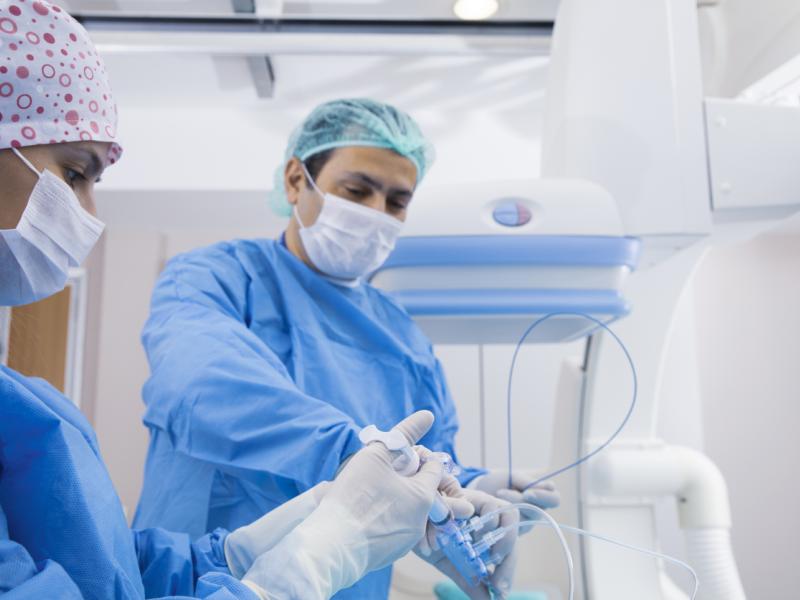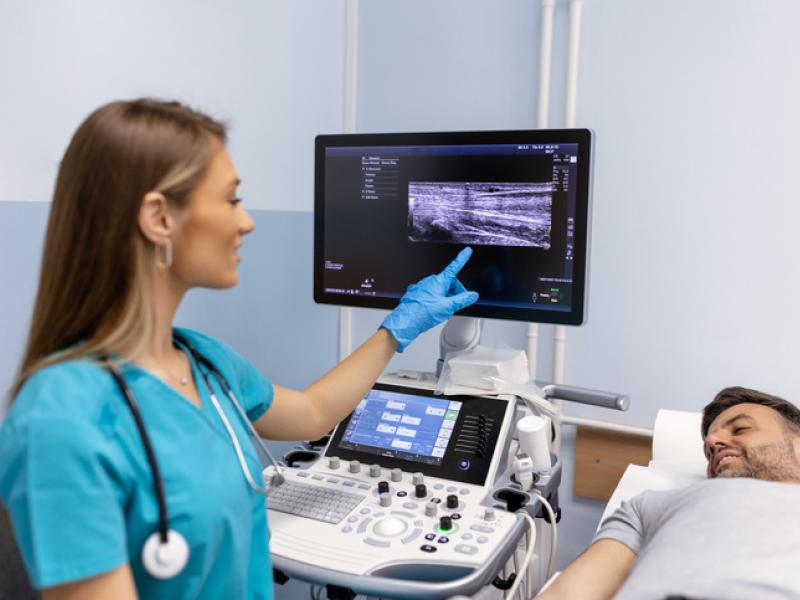Emphysema, a progressive form of chronic obstructive pulmonary disease (COPD), can severely limit...
Read More
Respiratory diagnostic tests empower you to take back control of your respiratory health. From FeNo testing to bronchoscopies, our team of pulmonary specialists offers a range of tests to inform your treatment plan and take steps toward healing.
Respiratory diagnostic tests are examinations that assess the functioning of your lungs and airways, helping your doctor accurately diagnose a pulmonary condition. If your doctor recommends a respiratory diagnostic test, it's because they want to gather specific information about your respiratory health beyond what can be determined through a physical exam alone. These tests are particularly useful for identifying conditions such as asthma, chronic obstructive pulmonary disease (COPD), and pulmonary fibrosis.
Unlike pulmonary function tests (PFTs) , which are noninvasive procedures that measure lung function through breathing maneuvers, respiratory diagnostic tests assess the underlying causes of respiratory symptoms. They can reveal details such as inflammation levels, airway constriction or the presence of abnormalities within the lungs.
When you undergo a respiratory diagnostic test, you'll be guided through procedures to evaluate your respiratory system. These tests range from noninvasive techniques, like measuring fractional exhaled Nitric Oxide (FeNo) levels, to more invasive procedures such as bronchoscopy. Each test provides valuable insights into your respiratory health, aiding in treatment decisions and monitoring the progression of respiratory conditions.


Invasive procedures such as bronchoscopy and pulmonary endoscopy involve gently inserting a small camera into your airways to get a closer view. Although more involved, these tests are vital for diagnosing conditions like lung cancer or infections that might not show up on less invasive tests.

Noninvasive tests, such as the fractional exhaled nitric oxide (FeNo) test and the methacholine challenge test or bronchoprovocation test, are gentle procedures that offer valuable insights into lung function without any discomfort. These tests are particularly helpful for assessing conditions like asthma by looking at how your airways react without the need for any invasive steps.

Imaging and visualization techniques, like endobronchial ultrasound (EBUS) and robotics navigational bronchoscopy, use advanced technology to create detailed pictures of your lungs and surrounding areas. These tests take a closer look inside your respiratory system, helping your doctors spot any potential issues such as tumors or enlarged lymph nodes.
When you undergo respiratory diagnostic testing at Inspira, you can expect compassionate care and comprehensive support every step of the way.
During your visit, you will be guided through the specific tests your pulmonary specialist recommended based on your symptoms and medical history. Whether it's a noninvasive test like FeNo testing or an invasive procedure like bronchoscopy, our experienced team will explain each step and answer any questions you may have.
Rest assured that at Inspira, we prioritize your safety and strive to provide accurate diagnoses to inform your treatment plan effectively.
The duration of a respiratory diagnostic test can vary depending on the specific test being performed. Noninvasive tests like FeNo testing may take around 15 to 30 minutes, while procedures such as bronchoscopy may last anywhere from 30 minutes to an hour or more.
Noninvasive tests like FeNo testing are generally painless and involve straightforward breathing maneuvers. However, some invasive procedures like bronchoscopy may cause mild discomfort or a sensation of pressure. Sedation may be provided to minimize discomfort.
Preparation requirements vary depending on the specific test. For some tests, such as bronchoscopy, you may need to fast for a certain period before the procedure. Your pulmonary specialist will provide detailed instructions on how to prepare for your specific test.
The turnaround time for results can vary depending on the complexity of the test and the facility where it is performed. In many cases, you can expect to receive your results within a few days to a week after the test.
While complications are rare, it's essential to report any unusual symptoms such as persistent coughing, chest pain or difficulty breathing to your doctor immediately. They can evaluate your symptoms and provide appropriate follow-up care if needed.

Emphysema, a progressive form of chronic obstructive pulmonary disease (COPD), can severely limit...
Read More
Mouth taping is a practice that promotes nasal breathing during sleep, which may improve sleep...
Read More
Walking pneumonia is a mild but disruptive form of pneumonia with symptoms like a lingering cough...
Read More